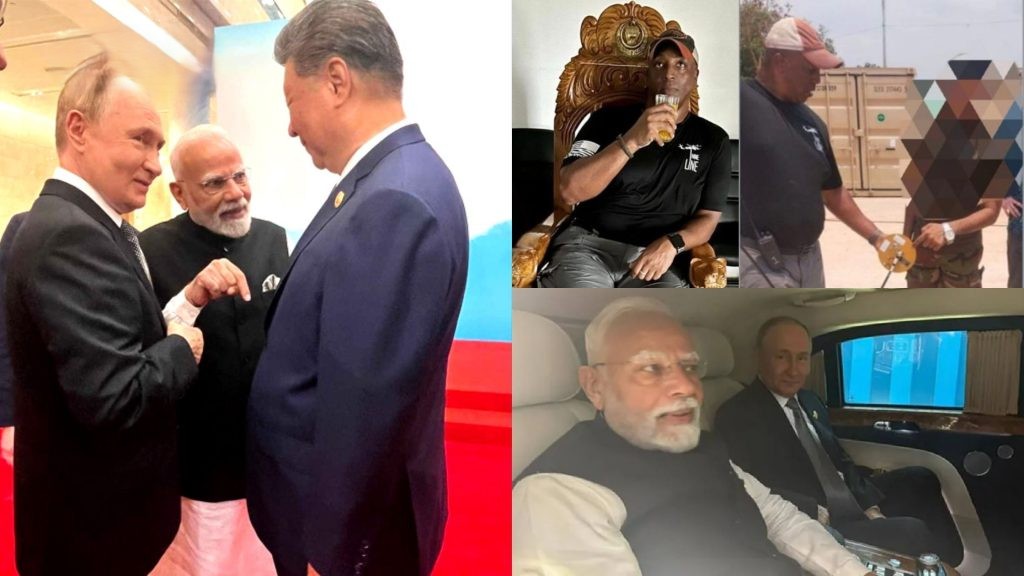Dhaka’s Dark Secret: The Plot Against Modi and the Power Triangle
“Inside the high-stakes intelligence operation that exposed a deadly plot against Prime Minister Modi — how China’s early warning, Putin’s strategic backing, and a rare Bharat-Russia-China alliance unraveled a covert US mission in Dhaka with far-reaching implications for South Asia’s geopolitical future.”
Paromita Das
New Delhi, 29th October: A chilling spy thriller unfolded in Dhaka on August 31, 2025, with the mysterious death of Terrence Arvelle Jackson, a U.S. Special Forces officer working under diplomatic cover. Found dead in the Westin Hotel, initial signs hinted at poisoning, but later reports revealed radioactive substances on his body—an ominous echo of Cold War covert killings. The incident exposed what Organiser calls a covert Western operation aiming to assassinate Bharatiya Prime Minister Narendra Modi during the SCO Summit and destabilize South Asia.
China’s Early Warning: The First Link in the Intelligence Chain

It was China’s Ministry of State Security (MSS) that first intercepted suspicious communications linked to a Western plot against Modi. This tip-off set in motion an unprecedented intelligence coordination involving India’s Research and Analysis Wing (RAW) and Russia’s Federal Security Service (FSB). Despite deep-rooted rivalries, the triangular cooperation allowed these agencies to monitor Jackson’s movements through high-end hotels and diplomatic circles in Dhaka.
Jackson, officially in Bangladesh under diplomatic cover, was reportedly coordinating covert operatives and Western-backed NGOs working closely with the interim government installed after Sheikh Hasina’s fall earlier in 2025. The objective went beyond simple political disruption—it was a sinister plan to create widespread chaos that would undermine Bharat’s growing influence within both SCO and BRICS.
The Putin Connection: Strategic Depth and Diplomatic Backing

In an extraordinary display of trust, Russian President Vladimir Putin privately briefed Modi during the SCO summit in a secure Aurus limousine. This rare, confidential encounter highlighted Moscow’s strategic investment in Bharat’s security amid complex regional challenges.
Putin’s involvement sent a clear message: Russia does not tolerate attempts to destabilize partners who play critical roles in shaping Eurasian geopolitics. This event underscored the hardening of what experts call the “Eurasian security arc”—a tacit alliance between Bharat, Russia, and China that counters Western influence in the region.
The Dhaka Nexus: A Hub of Covert Intrigue

Jackson’s real mission in Dhaka reportedly had little to do with benign military cooperation. His clandestine work focused on orchestrating destabilizing activities in Bangladesh in league with Western intelligence proxies and military contractors. Working under the cover of “security coordination,” he liaised with shadowy networks linked to the interim government led by Nobel laureate Muhammad Yunus.
The chilling aspect of this operation emerged as three additional foreign contractors connected to Jackson died in mysterious circumstances in Dhaka and nearby Chittagong. This sequence of events points to a covert cleanup designed to erase traces of the plot and foil counterintelligence efforts.
The American Silence: Denial and Deniability

Despite mounting speculation, the United States has maintained a deliberate silence. The U.S. Army Special Operations Command issued a vague statement asserting “all personnel accounted for” and denied ongoing operations in Bangladesh, yet made no reference to Jackson’s death or the alleged plot.
This silence may reflect the sensitive nature of the operation and diplomatic fears of unprecedented fallout. Publicly acknowledging involvement in an assassination attempt on a sitting foreign leader would represent a diplomatic and strategic catastrophe, undermining America’s stated commitment to international norms.
Geopolitical Repercussions: A New Security Equation

The exposure of this foiled operation indicates a major realignment in global power dynamics. The collaboration among Bharat, Russia, and China surpasses mere strategic alignment to become an active intelligence partnership.
This tripartite coordination challenges the existing Indo-Pacific framework, which largely sees Bharat as a linchpin in Western efforts to contain China. Instead, it reveals the emergence of a Eurasian security bloc prioritizing pragmatic cooperation over historical rivalry.
This new dynamic suggests that influence in South Asia—and the wider Eurasian landmass—will increasingly be shaped not only by open diplomacy but by behind-the-scenes intelligence collaboration designed to preserve regional stability and counter covert interference.
A Triumph of Strategic Autonomy

Bharat’s successful preemption of this plot underscores a maturing intelligence apparatus capable of protecting the nation’s leadership and strategic interests on multiple fronts. The intelligence synergy with Russia and China demonstrates that Bharat is willing and able to work beyond ideological divides to defend its sovereignty.
This incident should serve as a wake-up call on the importance of intelligence diplomacy in protecting democratic institutions amid growing hybrid warfare threats. Bharat’s resilience lies in its strategic partnerships and ability to anticipate and neutralize shadow threats that aim to destabilize both its internal governance and regional peace.
A Warning for the Future
The Dhaka assassination attempt, real or rumored, highlights the increasingly shadowy nature of global geopolitics. Information warfare and covert operations have become central tools as major powers jockey for influence in critical regions like South Asia.
Bharat’s ability to detect and foil this plot through a rare intelligence alignment with Russia and China signals the dawn of a new security paradigm. It confirms that future power struggles will be won not just on battlefields or trade deals, but in secret intelligence rooms, where alliances are forged and broken out of necessity rather than trust.
The conspicuous American silence and Bangladesh’s limited public disclosure deepen the mystery and underscore the risks inherent in today’s multipolar world. For Bharat, this episode offers both a lesson and a reassurance: strategic autonomy, backed by strong intelligence partnerships, is essential for safeguarding sovereignty in an era where the boundaries between peace and conflict are murkier than ever.

